A correspondent who heard my comments on Cyprus on KUOW’s Weekday program today asks: I am puzzled by some of your comments this morning. As I understand it, when a bank in the U.S. fails, the FDIC moves in and closes it. The accounts are protected by insurance up to [continue reading . . . ]
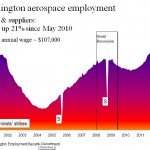
Three questions that we’ll know the answers to before 2013 is over: 1. Will Steve Ballmer remain in the driver’s seat at Microsoft? He’s been responsible for day-to-day operations for more than 14 years and CEO for a nice round dozen years. During his tenure, Microsoft has missed the boat [continue reading . . . ]
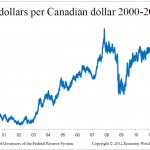
That’s the headline on Page 1 of the Seattle Times today. The article reports that some residents of the Bellingham area, an easy drive from the Canadian border, are grumbling that Canadian shoppers are overcrowding the parking lots of Costco Wholesale and other box stores on the U.S. side of the [continue reading . . . ]
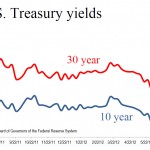
Interest rates on U.S. Treasury notes with a maturity of 10 years fell last month to nearly the lowest since World War II. They may go lower still. Today’s low rates reflect both the weak outlook for most advanced economies and a desperate scramble globally for safe places to park [continue reading . . . ]
The economic headlines are grim almost everywhere you look. An item on Page 1 of today’s Financial Times sums things up succinctly: Growth in the US is slowing, much of Europe is in recession, China’s growth outlook has weakened, the reform processes in India have stalled and other large emerging [continue reading . . . ]
Martin Wolf, much-honored chief economics commentator of the Financial Times, has been my beacon during the financial crisis. So it is especially discouraging to read his June 6, 2012, column, headlined “Panic has become all too rational”. Wolf argues that the advanced economies are caught in a “contained depression,” that [continue reading . . . ]
Uh, oh, indeed. The Financial Times reports in its May 31 edition that yields on two-year German bonds on May 30 fell to zero for the first time. As the Times put it, investors are willing to lend to Berlin for two years for no return. The yield on the [continue reading . . . ]
The trouble with the French is that they are sick and tired of austerity, and they won’t take it any more. Oh, and by the way, they want it all. Big government, check. The French public sector accounts for more than half of the economy. Early retirement, check. Voters threw [continue reading . . . ]
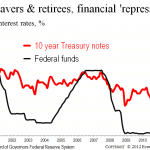
Prompted by reading, I’ve been thinking about an essay arguing that today’s exceptionally low interest rates are a form of default. The idea is far from original. Op-ed pieces in the Financial Times and the Wall Street Journal have seeded my thinking. An op-ed in today’s Wall Street Journal by [continue reading . . . ]
I think a lot about China these days. For nearly a year, a copy of the USA weekly edition of the China Daily, the official newspaper of China’s communist party, has landed on my doorstep every Friday, unbidden. It is a sample, probably related to my Wall Street Journal subscription. [continue reading . . . ]
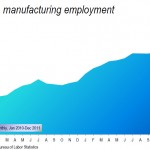
As I mentioned on KUOW’s Weekday program today, I was delighted to read in today’s Financial Times* that manufacturing employment has grown faster in the U.S. during this recovery than in any other advanced country. From January 2010, employment in U.S. factories has risen by 2.9% to nearly 11.8 million [continue reading . . . ]
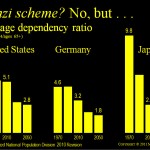
Is Social Security a Ponzi scheme, as Texas Gov. and GOP presidential candidate Rick Perry labeled it during the GOP candidates’ debate Sept. 7? The answer is “No.” Charles Ponzi gave money collected from early suckers attracted by phony promises of high returns to new suckers after taking a cut. [continue reading . . . ]